If you're a renter, you already know that eviction is something you'll want to avoid. It also should be a last resort for a landlord.
However, if you do get an eviction notice, know that moving out will take some time. But once the legal process begins, both parties should understand what's involved in an eviction lawsuit.
Here's everything you need to know about getting evicted.
So What Is Eviction?
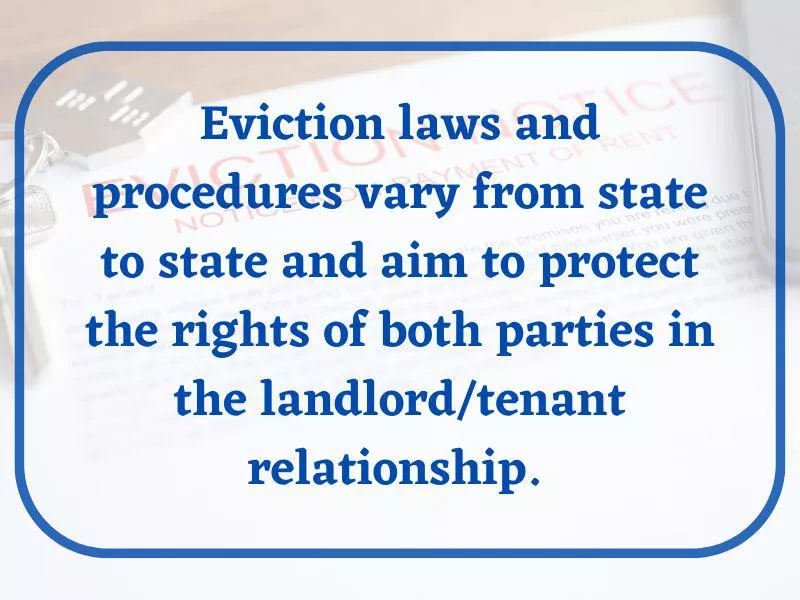
Work + Money
Eviction is a legal process that allows a landlord or property owner to remove a tenant from a rental property. Typically, eviction occurs for a specific reason.
During the eviction process, a landlord will provide notice to the renter that that they are being evicted. If the tenant doesn't move or address the issue within the deadline on the notice, the landlord will file a lawsuit to have them removed.
Eviction laws and procedures vary from state to state and aim to protect the rights of both parties in the landlord/tenant relationship.
Reasons a Landlord May Want a Tenant Out
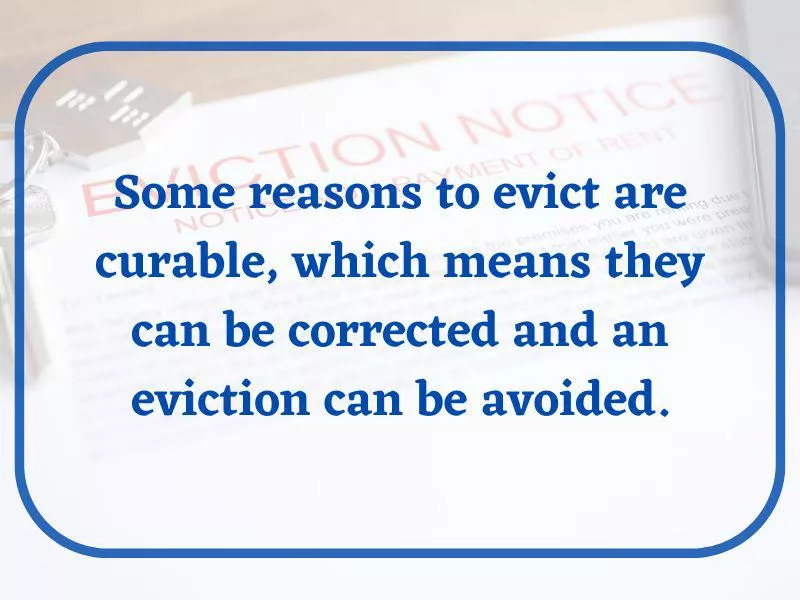
Work + Money
There are several reasons why a landlord may want to evict a tenant. Some common grounds include not paying rent, lease violations, property damage, illegal activity, an expired lease or personal use for the landlord.
Some reasons to evict are "curable" — for example, not paying rent — which means they can be corrected, and an eviction can be avoided. Some, like illegal activity, are not. The tenant will have to move, no matter what.
What Are Eviction Notices?
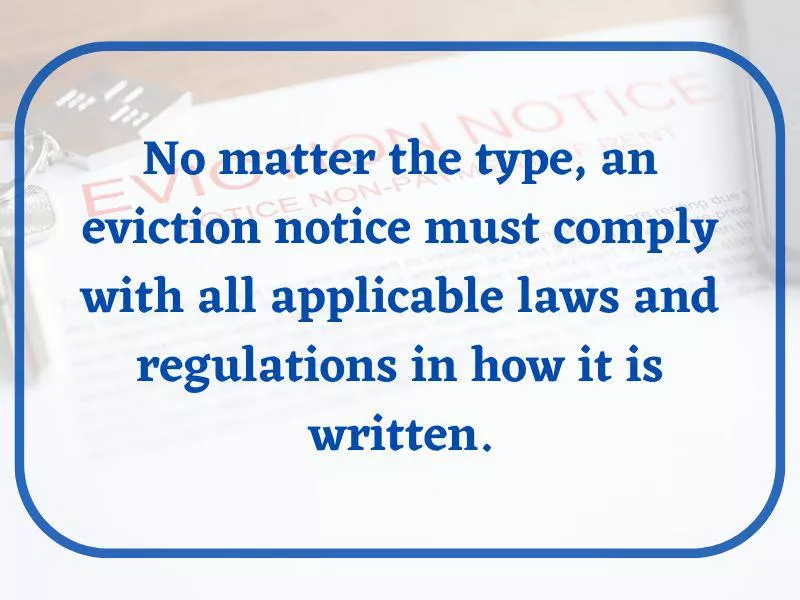
Work + Money
Eviction notices inform tenants that they are required to vacate the rental property. They include the reason for the eviction, the deadline by which the renter must move, and instructions on how to respond or contest the eviction.
Some common types of eviction notices include a "pay or quit" notice (for late rent), a "cure or quit" notice (for problems that can be fixed by the renter), an unconditional quit notice ( for serious lease violations or illegal activity) and a "notice to terminate tenancy" (used when a lease has expired and the landlord does not wish to renew it.)
No matter the type, an eviction notice must comply with all applicable laws and regulations in how it is written.
Does Your State Allow No-Fault Evictions?
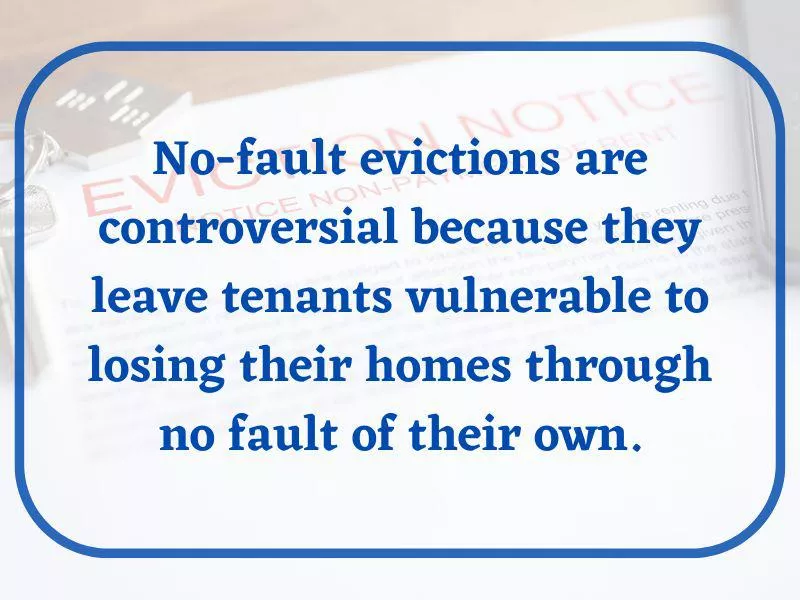
Work + Money
No-fault evictions (aka "no-cause" evictions) occur when a landlord notifies a renter they are about to be evicted but have no particular reason for doing so.
No-fault evictions are controversial because they leave tenants vulnerable to losing their apartments or homes through no fault of their own. Some jurisdictions have laws that limit or prohibit no-fault evictions, while others allow them under specific conditions.
Typically, month-to-month renters are subject to no-fault evictions.
What the Court Process Is Like
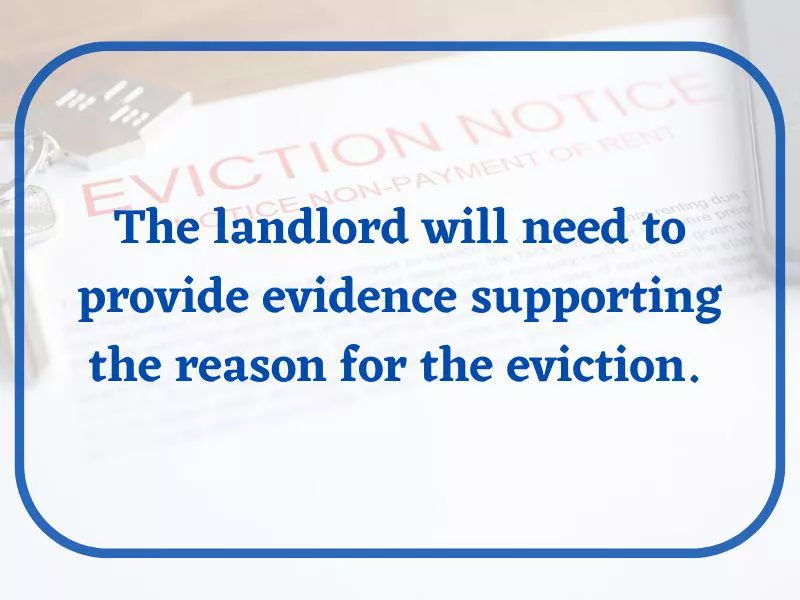
Work + Money
The specifics of the eviction court process will vary depending on the laws and procedures of the city, county or state of the property. In all cases, a landlord will initiate proceedings with the renter by serving them with a notice. If the renter does not address the notice by either moving or fixing the problem by a specific date, the landlord can file an eviction lawsuit in court.
The landlord will need to provide evidence supporting the reason for the eviction. The renter will then be served with a copy of the eviction lawsuit and a notice of the court date and time.
Once in court, the tenant will have the opportunity to tell their side of the story and offer supporting evidence. If the court finds in favor of the landlord, it will issue the eviction order requiring the tenant to vacate the property by a certain date.
If the tenant does not comply, the landlord will obtain a writ of possession, which allows them to physically remove the renter and their belongings. A tenant has the right to seek legal assistance and challenge the eviction if they believe it was wrongful or illegal.
Who Carries Out the Eviction?
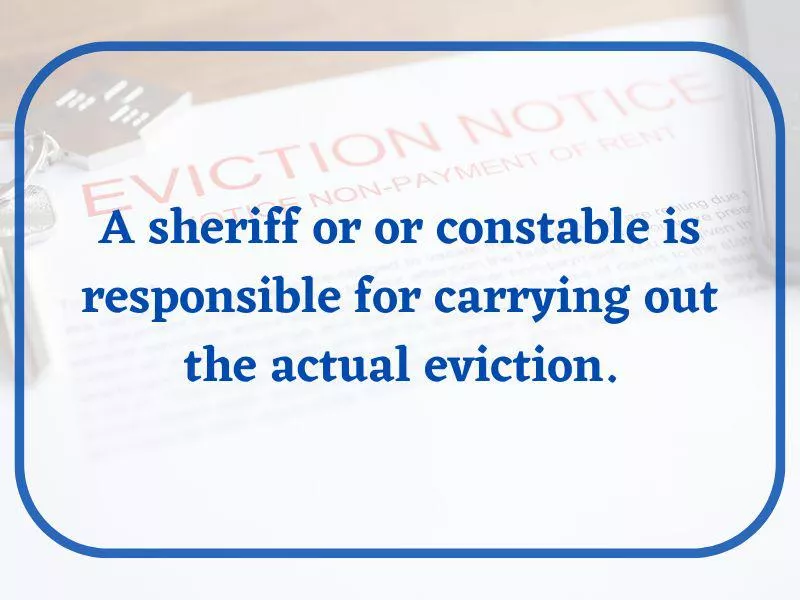
Work + Money
The process of carrying out an eviction can vary depending on the jurisdiction, but typically it is carried out by a law enforcement officer or a court-appointed official. In most cases, a sheriff or or constable is responsible for carrying out the actual eviction.
Once a court has issued an eviction order, the landlord or their representative will typically provide a copy of the order to law enforcement or the court-appointed official, who will then serve the tenant with a notice of the eviction date and time. This is usually a few days or weeks after the eviction order is issued.
On the day of the eviction, law enforcement or the court-appointed official will arrive at the rental property to physically remove the tenant and their belongings from the premises. They may be accompanied by movers or other personnel hired by the landlord to assist with the eviction.
If the tenant refuses to leave, the sheriff or official may use force to remove them, although this is a last resort.
Landlords Cannot Self-Evict Renter
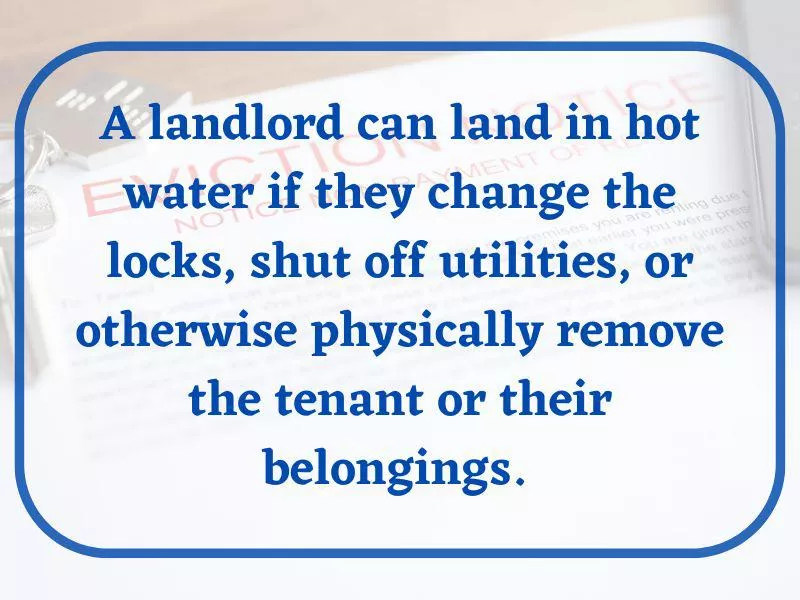
Work + Money
Landlords, regardless of the state or city, must follow proper legal procedures when evicting a tenant. Failure to do so can result in a lawsuit against the landlord.
Landlords are not allowed to evict a tenant themselves. "Self-help" evictions are illegal. A landlord can land in hot water if they change the locks, shut off utilities, or otherwise physically remove the tenant or their belongings.
What Happens to Someone's Property After They Vacate the Premises?
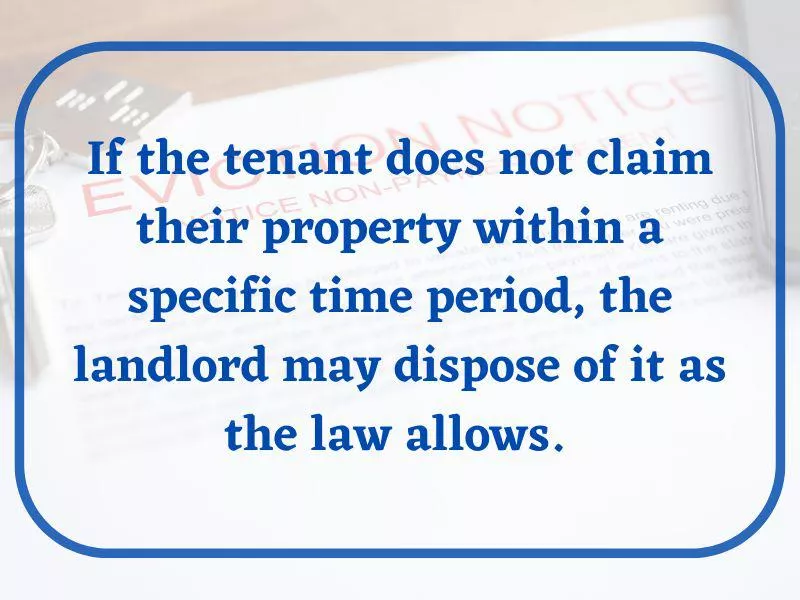
Work + Money
If the tenant has left personal property behind, the landlord must follow proper legal procedures for dealing with abandoned property. These vary from place to place.
Generally, the landlord must provide notice to the tenant informing them of the abandoned property and giving them a certain amount of time to claim it.
If the tenant does not claim their property within a specific time period, the landlord may dispose of it as the law allows.
What Are the Consequences of An Eviction?
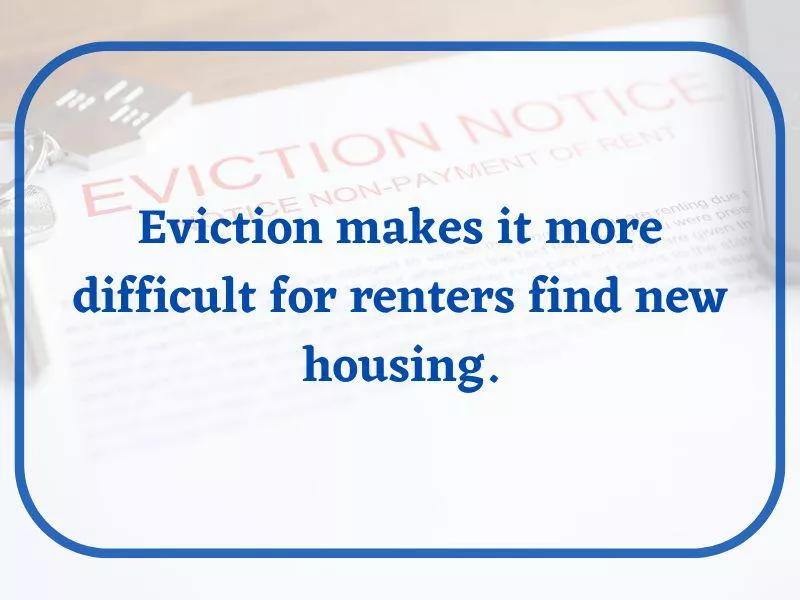
Work + Money
Eviction can not only result in the immediate loss of housing for a tenant, but it will also negatively impact their credit score and rental history. It's also an expensive process for the landlord.
Eviction makes it more difficult for renters to find new housing, as many landlords will require rental references and credit checks before renting to a new tenant.
What You Should Do If You're Being Evicted
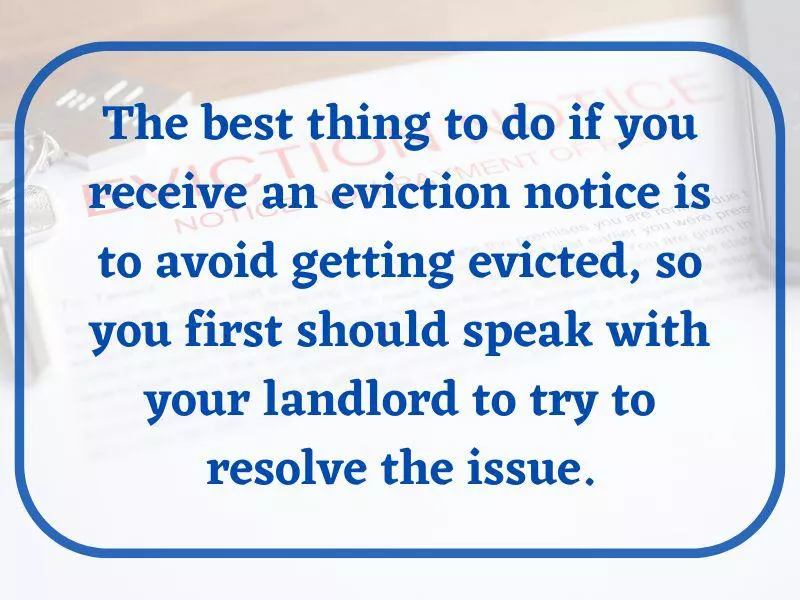
Work + Money
Remember, the best thing to do if you receive an eviction notice is to avoid getting evicted, so you first should speak with your landlord to try to resolve the issue.
If there is no way to avoid an eviction, you can seek legal assistance from a tenant rights organization, legal aid society, or private attorney.
Additionally, local government housing agencies and national organizations (for example, the National Low Income Housing Coalition or the National Housing Law Project) offer assistance and resources for those facing eviction.
